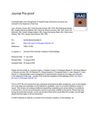 3 citations,
July 1993 in “Contraception”
3 citations,
July 1993 in “Contraception” Women with moderate body hair have higher levels of certain hormones and may benefit from treatment that increases sex hormone-binding protein.
 38 citations,
June 2003 in “Journal of Investigative Dermatology Symposium Proceedings”
38 citations,
June 2003 in “Journal of Investigative Dermatology Symposium Proceedings” Finasteride effectively improves hair growth and slows hair loss in men with male pattern baldness.
 1 citations,
October 2022 in “Annals of Translational Medicine”
1 citations,
October 2022 in “Annals of Translational Medicine” Cucurbitacin helps mice grow hair by blocking a protein that stops hair growth.
1 citations,
January 2019 The fenugreek seed extract gel can help with hair growth and reduce hair problems.
August 2024 in “Journal of Photochemistry and Photobiology B Biology” Combining light therapy with certain substances improves hair growth in people with hair loss.
May 2024 in “Molecules/Molecules online/Molecules annual” Plant extracts can help prevent hair loss and promote hair growth.
 April 2024 in “Journal of translational medicine”
April 2024 in “Journal of translational medicine” MJ04, a new compound, effectively promotes hair growth and is a potential topical treatment for hair loss.
 January 2024 in “JOJ Dermatology & Cosmetics”
January 2024 in “JOJ Dermatology & Cosmetics” TH07 treatment is promising for hair growth, with higher satisfaction in males.
 October 2023 in “Current Issues in Molecular Biology”
October 2023 in “Current Issues in Molecular Biology” The YH complex, made from Astragalus membranaceus and Cinnamomum cassia, may help treat hair loss by promoting hair growth and follicle development.
 February 2023 in “Molecules”
February 2023 in “Molecules” Cactus extract from Notocactus ottonis may help promote hair growth.

KY19382 helps to regrow hair and create new hair follicles.
88 citations,
June 2019 in “Cell reports” Certain small molecules can promote hair growth by activating a cellular cleanup process called autophagy.
 15 citations,
September 2006 in “Journal of International Medical Research”
15 citations,
September 2006 in “Journal of International Medical Research” Nourkrin® significantly increased hair growth and was well-tolerated by people with hair loss.
May 2024 in “Pharmacia/Farmaciâ” Purple sweet potato leaf extracts can help treat hair loss and fungal infections.
 13 citations,
January 2016 in “Journal of cosmetology & trichology”
13 citations,
January 2016 in “Journal of cosmetology & trichology” Alternative treatments show promise for hair growth beyond traditional methods.
 18 citations,
January 2008 in “Journal of The American Academy of Dermatology”
18 citations,
January 2008 in “Journal of The American Academy of Dermatology” Certain proteins and their receptors are more active during the growth phase of human hair and could be targeted to treat hair disorders.
 7 citations,
September 2020 in “Journal of The American Academy of Dermatology”
7 citations,
September 2020 in “Journal of The American Academy of Dermatology” Low-dose oral minoxidil for hair loss can cause mild excessive hair growth, usually appearing within the first 3 months, but it can be managed by adjusting the dose or removing the unwanted hair, with most people not needing to stop the treatment.
 6 citations,
November 2010 in “Histochemistry and cell biology”
6 citations,
November 2010 in “Histochemistry and cell biology” The proteins transthyretin and megalin are more present in the growth phase of hair, suggesting they might affect hair health and growth.
 4 citations,
July 2021 in “Journal of Dermatological Treatment”
4 citations,
July 2021 in “Journal of Dermatological Treatment” Finasteride helps hair growth but may cause sexual side effects and depression.
 January 2025 in “Journal of Medicinal Food”
January 2025 in “Journal of Medicinal Food” Soybean extract may help hair growth in testosterone-related hair loss.
 June 2020 in “Journal of clinical and investigative dermatology”
June 2020 in “Journal of clinical and investigative dermatology” Nourkrin® Woman with Marilex® improves hair growth, appearance, and confidence in women with hair loss.
 8 citations,
October 2017 in “Dermatology practical & conceptual”
8 citations,
October 2017 in “Dermatology practical & conceptual” A spermidine-based supplement may help hair grow longer by keeping it in the growth phase.
 5 citations,
March 2021 in “International Journal of Dermatology”
5 citations,
March 2021 in “International Journal of Dermatology” Biotin supplementation during isotretinoin treatment for acne may help maintain skin hydration and improve hair growth.
 2 citations,
January 2023 in “Pharmaceuticals”
2 citations,
January 2023 in “Pharmaceuticals” Natural products and phytochemicals may help with hair regrowth, but more research is needed.
July 2018 in “Current Analytical Chemistry” The method effectively detects minoxidil in hair-growth products.
January 2022 in “Advances in Clinical Medicine”  19 citations,
January 1997 in “Dermatologic Clinics”
19 citations,
January 1997 in “Dermatologic Clinics” Most treatments for hair loss in 1997 were not effective for most people, and maintaining hair growth was difficult.
July 2005 in “Indian Journal of Dermatology”  14 citations,
August 2020 in “Dermatologic Therapy”
14 citations,
August 2020 in “Dermatologic Therapy” Low-dose oral minoxidil is a safe treatment for hair loss, with the main side effect being excessive hair growth. Other side effects like foot swelling, low blood pressure when standing, and heart rate changes are rare.
 14 citations,
May 2005 in “Farmaco”
14 citations,
May 2005 in “Farmaco” A method was created in 2005 to identify minoxidil, a hair growth ingredient, in products using two types of capillary zone electrophoresis, and it found that most products had about 2% minoxidil.






















